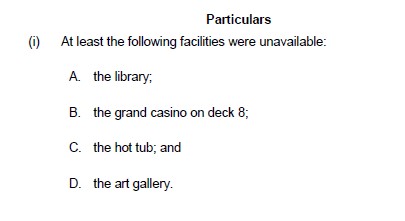Federal Court of Australia
McLean-Phillips v Carnival plc t/as P&O Cruises Australia [2023] FCA 328
ORDERS
Applicant | ||
AND: | CARNIVAL PLC T/AS P&O CRUISES AUSTRALIA Respondent | |
DATE OF ORDER: | 12 April 2023 |
THE COURT ORDERS THAT:
1. The Statement of Claim be struck out.
2. The applicant pay the respondent’s costs of the interlocutory application filed on 24 March 2023.
3. The applicant file and serve any Amended Statement of Claim by 12 May 2023.
4. The matter be stood over to 9.30am on 19 May 2023 for a case management hearing before me.
Note: Entry of orders is dealt with in Rule 39.32 of the Federal Court Rules 2011.
JACKMAN J
1 This is an application to strike out the entirety of the Statement of Claim filed in these proceedings on the grounds enumerated in r 16.21(1)(c), (d) and (e) of the Federal Court Rules 2011 (Cth). The primary basis for seeking that the Statement of Claim be struck out is that it fails to disclose any reasonable cause of action, because the applicant has failed to allege material facts necessary for the claims which she seeks to bring.
The Statement of Claim
2 The proceedings are brought by the applicant on her own behalf and on behalf of represented persons pursuant to Pt IVA of the Federal Court of Australia Act 1976 (Cth) (the Group Members). I set out below the paragraphs of the Statement of Claim which relate to the claim made by the applicant herself.






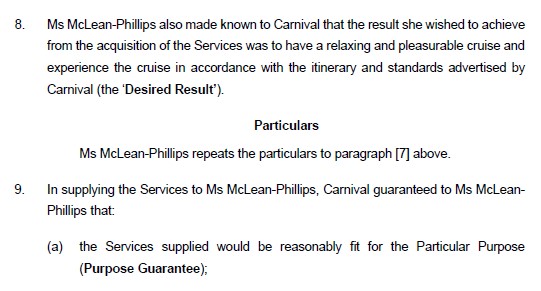

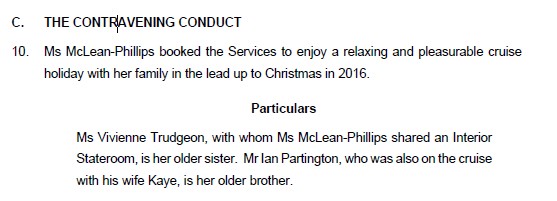

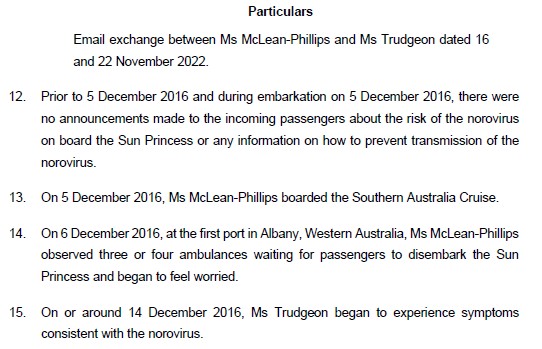

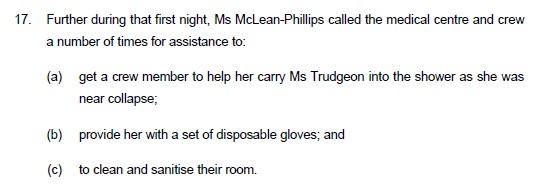

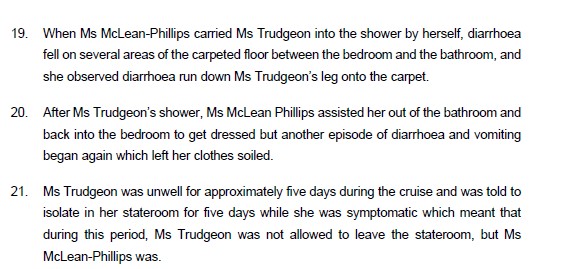
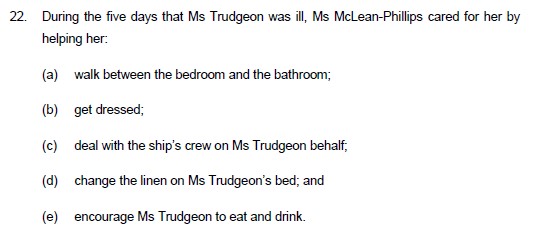
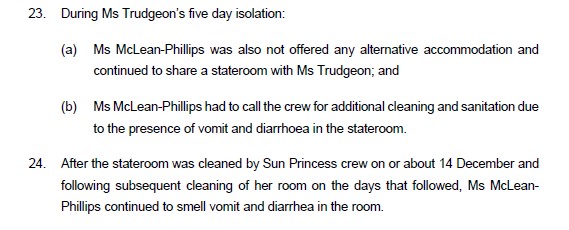
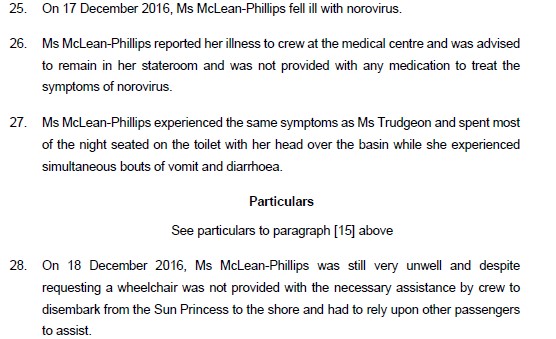


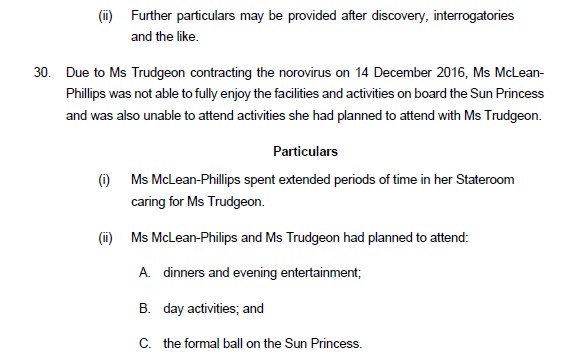
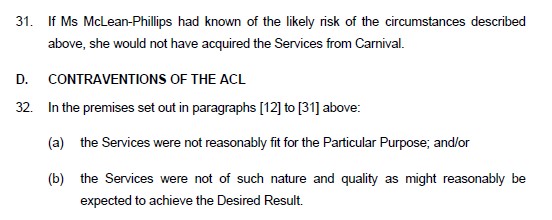
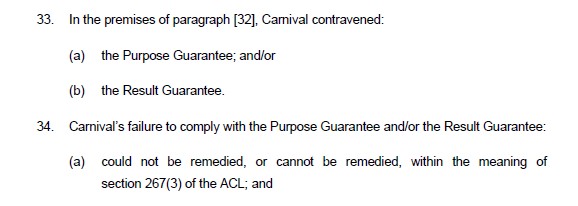
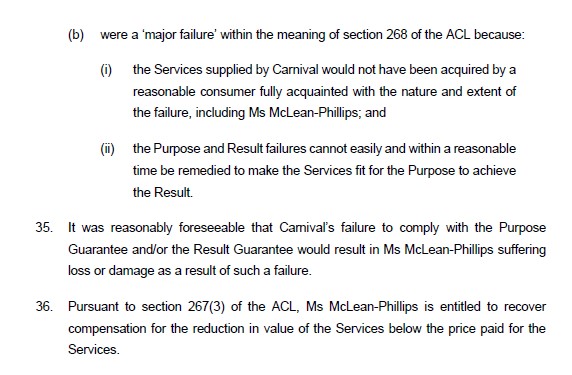
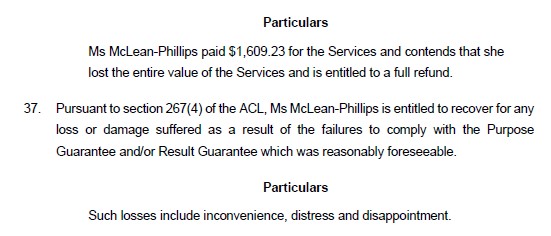
3 The pleading of the claims of the Group Members adopts a similar approach, focusing on an allegation that some or many of the Group Members during the Sun Princess cruise became sick with the norovirus, and that as a result of the outbreak of the norovirus, many of the facilities on the ship were not available to Group Members, many of the Group Members were unable to enjoy the activities they had planned either due to their illness or the illness of others, and many of the Group Members were unable to enjoy being on the ship and would not have acquired the relevant services if they had known of the “likely” risk of the norovirus outbreak. I place the word “likely” in quotation marks because there is no allegation of a material fact to the effect that the risk was likely rather than, say, remote. The same point applies to paragraph 31 of the Statement of Claim.
4 The respondent has helpfully divided the allegations made in paragraphs 12 to 31 of the Statement of Claim in relation to the applicant’s claim into three sets of allegations. The first comprises paragraphs 12 and 31, dealing with the absence of warning of the risk of norovirus, but in a way which is not connected to any alleged duty to give such a warning or any service of doing so. The second set comprises paragraphs 13-16, 19, 20, 22, 25, 27 and 30, dealing with the applicant and her sister becoming sick with the norovirus, but not in a way which alleges that the respondent failed to provide some service which it was required to provide. The third set comprises paragraphs 17, 18, 21, 23, 24, 26, 28 and 29, where there is some reference to services but not in a way which alleges any departure from the standard required by the relevant legislation.
Salient Legislative Provisions
5 The applicant seeks to invoke the following provisions of the Australian Consumer Law (ACL), being Schedule 2 to the Competition and Consumer Act 2010 (Cth).
61 Guarantees as to fitness for a particular purpose
(1) If:
(a) a person (the supplier) supplies, in trade or commerce, services to a consumer; and
(b) the consumer, expressly or by implication, makes known to the supplier any particular purpose for which the services are being acquired by the consumer;
there is a guarantee that the services and any product resulting from the services, will be reasonably fit for that purpose.
(2) If:
(a) a person (the supplier) supplies, in trade or commerce, services to a consumer; and
(b) the consumer makes known, expressly or by implication, to:
(i) the supplier; or
(ii) a person by whom any prior negotiations or arrangements in relation to the acquisition of the services were conducted or made;
the result that the consumer wishes the services to achieve; there is a guarantee that the services, and any product resulting from the services, will be of such a nature, and quality, state or condition, that they might reasonably be expected to achieve that result.
(3) This section does not apply if the circumstances show that the consumer did not rely on, or that it was unreasonable for the consumer to rely on, the skill or judgment of the supplier.
(4) This section does not apply to a supply of services of a professional nature by a qualified architect or engineer.
267 Action against suppliers of services
(1) A consumer may take action under this section if:
(a) a person (the supplier) supplies, in trade or commerce, services to the consumer; and
(b) a guarantee that applies to the supply under Subdivision B of Division 1 of Part 3-2 is not complied with; and
(c) unless the guarantee is the guarantee under section 60-the failure to comply with the guarantee did not occur only because of:
(i) an act, default or omission of, or a representation made by, any person other than the supplier, or an agent or employee of the supplier; or
(ii) a cause independent of human control that occurred after the services were supplied.
…
(3) If the failure to comply with the guarantee cannot be remedied or is a major failure, the consumer may:
(a) terminate the contract for the supply of the services; or
(b) by action against the supplier, recover compensation for any reduction in the value of the services below the price paid or payable by the consumer for the services.
(4) The consumer may, by action against the supplier, recover damages for any loss or damage suffered by the consumer because of the failure to comply with the guarantee if it was reasonably foreseeable that the consumer would suffer such loss or damage as a result of such a failure.
(5) To avoid doubt, subsection (4) applies in addition to subsections (2) and (3).
268 When a failure to comply with a guarantee is a major failure
A failure to comply with a guarantee referred to in section 267(1)(b) that applies to a supply of services is a major failure if:
(a) the services would not have been acquired by a reasonable consumer fully acquainted with the nature and extent of the failure; or
(b) the services are substantially unfit for a purpose for which services of the same kind are commonly supplied and they cannot, easily and within a reasonable time, be remedied to make them fit for such a purpose; or
(c) both of the following apply:
(i) the services, and any product resulting from the services, are unfit for a particular purpose for which the services were acquired by the consumer that was made known to the supplier of the services;
(ii) the services, and any of those products, cannot, easily and within a reasonable time, be remedied to make them fit for such a purpose; or
(d) both of the following apply:
(i) the services, and any product resulting from the services, are not of such a nature, or quality, state or condition, that they might reasonably be expected to achieve a result desired by the consumer that was made known to the supplier;
(ii) the services, and any of those products, cannot, easily and within a reasonable time, be remedied to achieve such a result; or
(e) the supply of the services creates an unsafe situation.
n act, default or omission of, or a representation made by, any person other than the supplier, or an agent or employee of the supplier; or
The Central Issue
6 The issues concern whether the pleading is sufficient for the purposes of ss 267(1)(b), 267(3), 267(4) and 268 of the ACL. The respondent no longer presses a complaint foreshadowed earlier concerning the pleading of the elements of s 267(1)(c).
7 The respondent submits that in order to establish that a guarantee under s 61 of the ACL was not complied with, it is not enough simply to allege that the guarantees applied and that some unsatisfactory result occurred. To found an action, the respondent submits that there must be material facts alleged as to why the services themselves were not reasonably fit for purpose or were not of such a nature and quality, state or condition that might reasonably be expected to achieve a particular result. The respondent has adopted the useful shorthand expression “deficiency in services” as a convenient way of expressing those requirements of ss 61 and 267(1)(b). In short, the respondent submits that the proposed causes of action require that some deficiency in the services provided must be pleaded. The respondent submits that the fundamental defect with the claim as presently pleaded is the failure to allege any material facts linking the services provided by the respondent with the alleged unsatisfactory state of affairs that transpired, pointing out that no material fact as to any deficiency or issue with the services is asserted. The respondent submits that there is no allegation that anyone’s illness was connected with any services of the respondent. The respondent submits that the absence of a pleaded link between the services and the outcome of the cruise is fatal to the claim.
8 The applicant submits that her claim is very simple. She wanted a relaxing and enjoyable cruise and to experience the cruise in accordance with the itinerary and high standards advertised by the respondent. Instead, she and her sister became very ill with the symptoms of the norovirus for the last four days of the cruise. That experience was not relaxing or enjoyable. Further, the applicant says that the outbreak of the norovirus had also affected the cruise before the applicant’s sister became ill by reason of the withdrawal of ordinary services on the cruise due to the disease (see paragraph 29 of the Statement of Claim). In addition, paragraph 31 alleges that the significant unpleasantness and distress caused by the outbreak of the norovirus on the cruise meant that if the applicant had known of the “likely” risk of it occurring, she would not have gone on the cruise. Importantly, the applicant says that the respondent’s complaints that the pleading does not identify any deficiency in the services which led to a breach of the guarantees misconceive that the facts pleaded by the applicant objectively indicate that the applicant did not have a relaxing nor enjoyable cruise experience in accordance with the itinerary and standards advertised by the respondent. The applicant says that the connection to the services provided by the respondent is that she and her sister both became ill during the outbreak of the norovirus on the cruise.
9 No authority has been cited by the applicant for the approach which she has taken in propounding her case in this way. These proceedings appear to be the first time that a claimant has invoked the statutory provisions (or their predecessors) without a specific pleading of some deficiency in the relevant goods or services. The present proceedings may be contrasted with other cases brought pursuant to these provisions concerning experiences on cruise ships or river boat cruises, such as Scenic Tours Pty Ltd v Moore [2018] NSWCA 238; (2018) 361 ALR 456 and Karpik v Carnival plc (The Ruby Princess) [2022] FCA 1232.
Consideration
10 The starting point for analysis must be the language of the statutory provisions themselves: see Courtney v Medtel Pty Ltd [2003] FCA 36; (2003) 126 FCR 219 at [192] (Sackville J).
11 Section 61(1) of the ACL imposes on the supplier of services in certain circumstances a guarantee that the services, and any product resulting from the services, will be “reasonably fit for that purpose”. Plainly enough, that is not an absolute guarantee of fitness for purpose, but one which is controlled by the concept of “reasonably fit”. In assessing whether that guarantee has been complied with, the analysis must deal with the services actually provided, and whether they were in fact reasonably fit for the particular purpose.
12 Section 61(2) of the ACL imposes on the supplier of services in certain circumstances a guarantee that the services, and any product resulting from the services, will be “of such a nature, and quality, state or condition, that they might reasonably be expected to achieve” the result that the consumer wishes the services to achieve. The quoted language focuses attention on the nature and quality, state or condition of the services actually provided, and tests those matters against a standard of reasonableness in achieving the desired result. A failure to comply with that guarantee must therefore be assessed according to the nature and quality, state or condition of the services actually provided.
13 Turning then to s 267(1)(b) of the ACL, in order to establish that these guarantees are not complied with, the analysis must be directed to the services actually provided, and to some shortcoming or deficiency in those services. It cannot be sufficient to say that the cruise ship operator promised a relaxing and enjoyable holiday, but the claimant has in fact had a miserable and stressful time. In my opinion, there would have to be some link between an identified deficiency in the services provided and the lack of relaxation and enjoyment which resulted from that.
14 The applicant alleges also that the failures to comply with the guarantees referred to in s 267(1)(b) were “major failures” within the meaning of s 268, so as to invoke the remedy of compensation under s 267(3)(b). The applicant relies on subparagraphs (a), (c) and (d) of s 268(1), which require the applicant to establish that the services, respectively, “would not have been acquired by a reasonable consumer fully acquainted with the nature and extent of the failure”, “are unfit for a particular purpose”, and “are not of such a nature, or quality, state or condition, that they might reasonably be expected to achieve a [desired] result”, and the services “cannot, easily and within a reasonable time, be remedied” to make them fit for purpose or to achieve such a result. Each of those concepts requires identification of some deficiency or shortcoming in the supply of the relevant services. These elements cannot be addressed in any meaningful way if the applicant merely alleges that the respondent promised a relaxing and enjoyable experience, and it was not.
15 The point may be illustrated by changing the facts from allegations of a contagious disease to an allegation of seasickness. Counsel for the applicant appeared to accept that a logical corollary of the construction of ss 61 and 267 which she was advancing was that a passenger who (without any prior knowledge of vulnerability to seasickness) suffered acute seasickness for the entirety of the cruise, and therefore had a thoroughly miserable holiday, would probably have a valid claim for compensation against the cruise ship operator, on the ground that the cruise ship operator had promised that passenger a relaxing and enjoyable time. That strikes me as a conclusion so surprising that it would require the clearest possible expression in the legislation for it to be accepted. In my view, for a passenger in those circumstances to be able to make a claim, such a passenger would have to identify some specific deficiency in the services provided, for example, that the services included medical services and appropriate medication could have been provided to alleviate the symptoms of seasickness but was not.
16 Similarly, there may unexpectedly be heavy storms for the duration of a cruise on a ship, which may mean that the passengers do not experience a relaxing and enjoyable holiday. It is difficult to imagine that the cruise ship operator would be liable pursuant to ss 61 and 267 in those circumstances, unless for example there were some shortcoming in the services provided, for example a deficiency in the safety procedures and equipment on board the ship which caused particular injury or anxiety, or a substantial deviation from the planned itinerary.
17 As I have already mentioned, this appears to be the first occasion when a claimant has sought to rely upon ss 61 and 267 without alleging any particular deficiency in the services provided or any link between the actual services provided and the alleged unsatisfactory state of affairs that occurred. However, there are clear indications in the relevant authorities which favour the respondent’s contentions.
18 In Courtney v Medtel Pty Ltd, above, Sackville J dealt with a claim pursuant to ss 74B and 74D of the Trade Practices Act 1974 (Cth) (the TPA), the then statutory provisions relating to goods being of merchantable quality and fitness for purpose. His Honour found that certain pacemakers were not of merchantable quality because they were subject to a significant superadded risk of premature failure by reason of the materials used in the manufacturing process not being as fit for the purpose of restoring and maintaining heartbeat as it was reasonable to expect (an element of s 74D dealing with merchantable quality). While his Honour did not need to consider the alternative claim of lack of fitness for purpose pursuant to s 74B, his Honour said at [242] that if it had been necessary to do so, his Honour would have found that the pacemaker was acquired for the particular purpose of enabling it to be implanted on the advice of doctors into the individual patient experiencing heart-related problems, in order to restore and maintain regular heartbeat by means of electrical impulses sent to the heart. For the reasons given in relation to s 74D, Sackville J found at [242] that each pacemaker manufactured using the defective materials was not reasonably fit for that purpose. Accordingly, the lack of fitness for purpose was based on a specific defect in what was supplied. The Full Court dismissed an appeal without reference to Sackville J’s obiter dicta concerning s 74B: Medtel Pty Ltd v Courtney [2003] FCAFC 151; (2003) 130 FCR 182.
19 In Thomas v Foreshore Marine Exhaust Systems Pty Ltd [2005] NSWCA 451 (Thomas), a fibreglass boat sank after the water-lift muffler failed. The primary judge rejected the claim against the manufacturer of the muffler for a breach of the implied guarantee of fitness for purpose under s 74B of the TPA on the basis that the plaintiff had failed to establish the mechanism by which the muffler had failed, and therefore had failed to establish that the muffler was unfit for purpose. Santow JA (with whom Bryson JA and McClellan CJ at CL agreed) summarised the primary judge’s reasoning on s 74B as being that the claimants’ expert evidence did not establish what was wrong with the manufacturer’s manufacturing process that rendered the muffler not reasonably fit for the purpose for which it was supplied: see [46]. That finding was reversed on appeal, but not on a point of principle. The Court of Appeal considered that the evidence did demonstrate that the process of design and manufacture was inadequate, resulting in leakage and the ultimate failure of the muffler, and for that reason the muffler was not reasonably fit for its main purpose: see [67].
20 The applicant submits that the reasoning in that case is distinguishable because the case dealt with a physical and tangible object, and there were many possible reasons why the muffler had failed. The applicant says the problem in that case emerged after the supply of the goods, in contrast to the present case where the failure of certain services arises during the period when the supply is occurring. I do not regard the case as being distinguishable for those reasons. In the present case, there are many possible reasons for passengers falling ill and continuing to be ill during a cruise, which may or may not be connected to the services provided by the cruise operator. The mere fact that the illness occurred during the cruise does not establish that the illness is attributable to some deficiency in the services provided by the cruise operator. The point concerning timing goes nowhere, in my opinion, as the defect in the muffler in Thomas arose during the manufacturing process, and therefore existed at the time that the goods were supplied, albeit as a latent defect. The significance of the reasoning in Thomas is that the question whether there was some identified and proven defect in what was supplied was crucial to the success or failure of the claim.
21 In Scenic Tours Pty Ltd v Moore [2018] NSWCA 238; (2018) 361 ALR 456 (Scenic Tours), the operator of European river cruises was found to have contravened the guarantees in s 61 of the ACL in circumstances where, by reason of flooding and rising river levels prior to the commencement of the various cruises, it had substituted a different vessel for part of certain of the river cruises, and otherwise the river cruises were disrupted by passengers spending many uncomfortable hours on buses between stops, rather than cruising along the river on the vessel. Sackville AJA (with whom Payne JA and Barrett AJA agreed) held that the services provided were not fit for the purpose the claimant made known to it, namely to experience a cruise in accordance with the itinerary published in the brochure and booked by him: see [231]. The services the operator supplied to the claimant bore remarkably little resemblance to the itinerary set out in the brochure and in his personalised booklet, for which he paid a considerable amount of money; Scenic provided very little cruising but a great deal of lengthy and often uncomfortable coach travel and there was a gross disparity between the services Scenic actually supplied and the services that could reasonably satisfy the particular purpose the claimant made known to Scenic: see [232]. It was the great disparity between the services needed to fulfil the claimant’s particular purpose and the services actually supplied by Scenic that underpinned the finding that Scenic contravened the guarantee of fitness for purpose; the contravention was not established merely by proving a failure to supply one or several components of a large suite of services the passenger expected to receive: see [233]-[234]. It was accepted that the concept of reasonableness may allow the Court to take into account that Scenic could not control weather, water levels and unexpected transport restrictions; for example, a holiday in the sun may be reasonably fit for purpose notwithstanding that it rains incessantly (unless, perhaps, the service provider knew that the holiday was scheduled for the monsoon season): see [235]. However, it is not necessarily the case that a service provider cannot contravene the guarantee of fitness for purpose if the failure to provide the expected services is due to circumstances beyond the provider’s control; in each case an assessment has to be made of the services actually provided, making due allowance for the inevitable vicissitudes that can affect even the most meticulous travel and touring arrangements: see [236]. In Scenic Tours, the great disparity between the services supplied and those needed to fulfil the particular purpose were such that the services supplied were not fit for that purpose: see [237]. In all of this reasoning, the Court was focused on particular deficiencies or shortcomings in the services actually supplied, and contrasting those actual services with those services needed to fulfil the particular purpose.
22 All of these cases are consistent with the respondent’s argument on this application. The reasoning in these cases is inconsistent with the submission put by the applicant that the mere fact that an outbreak of communicable disease occurs on a cruise ship leading to illness and the inability to enjoy some of the ship’s facilities is sufficient to constitute a deficiency in the services and a failure to comply with the guarantees under s 61. The applicant’s submission would have the effect of turning the guarantees in s 61 into absolute guarantees of fitness for purpose and achievement of the desired result, contrary to the standards of reasonableness which are expressly embedded in the language of s 61.
23 The respondent also submits that the Statement of Claim has failed to disclose any material facts that are capable of establishing a causal link between the services actually provided and the alleged loss or damage suffered or the reduction in the value of services received. Section 267(3) of the ACL provides that where a failure to comply with a guarantee cannot be remedied or is a major failure, the consumer may recover compensation “for any reduction in the value of the services below the price paid”. The respondent submits that that provision requires that material facts be alleged as to how the services that were actually supplied to the applicant were of a value less than that which was paid by the applicant, and no such material facts are alleged in the Statement of Claim. I agree with that submission. It is not possible to ascertain from the current pleading what aspect or aspects of the services actually provided rendered them of less value than what had been paid by the applicant.
24 As to the pleaded claim for damages, s 267(4) makes such a claim available for loss and damage suffered “because of” the supplier’s failure to comply with a relevant guarantee, and where such loss or damage was reasonably foreseeable as a result of such failure. I agree with the respondent’s submission that the expression “because of” requires a causal link to be pleaded between the relevant breach of the statutory guarantee and the loss or damage. That in turn requires that there be specific identification of the deficiency or shortcoming in the services actually provided so that the elements of causation and reasonable foreseeability can be analysed by reference to the specific failure which is complained of.
25 The point concerning causation may be illustrated by reference to Merck Sharp & Dohme (Australia) Pty Ltd v Peterson [2011] FCAFC 128; (2011) 196 FCR 145. That case concerned the former s 74B of the TPA, providing for compensation where goods were supplied that were not reasonably fit for purpose. The claimant in that case suffered a heart attack after taking medication that substantially increased the risk of a heart attack. However, the evidence fell short of establishing that the medication itself was a necessary condition of the plaintiff’s heart attack, there being several other likely causes: see [165] and [175]. One can only engage in the necessary causal enquiry once the specific deficiency in the goods or services in question has been identified and proved.
26 Finally, I note that the applicant placed considerable emphasis in its written submissions on the proposition that liability under s 267 of the ACL for failure to comply with the guarantees in s 61 does not depend on whether the supplier exercised reasonable care, referring to Gharibian v Propix Pty Ltd [2007] NSWCA 151 at [62] (Ipp JA, with whom Mason P and Tobias JA relevantly agreed). While that submission is undoubtedly correct, I do not regard it as germane to the current dispute.
Conclusion
27 In my opinion, the Statement of Claim should be struck out in its entirety. The applicant should pay the respondent’s costs of the interlocutory application filed on 24 March 2023.
28 The respondent submitted that an appropriate regime to address the matter would be that the applicant should serve an Amended Statement of Claim in draft within four weeks, and the respondent would indicate any objection to the applicant within a further two weeks, before the matter would return to court for a further case management hearing about a week later. One might have thought that that was a generous offer for the respondent to make, given that it contemplated an opportunity for the applicant to consider any reasoned objection which the respondent might have to a re-pleaded case before having to commit herself to filing the new pleading. Surprisingly, the applicant rejected that proposal, insisting that she was entitled as of right to amend her pleading once, at any time before the pleadings close, without the leave of the Court: r 16.51(1) of the Federal Court Rules 2011 (Cth). Given the stance the applicant has taken, I will simply direct that the applicant file and serve any Amended Statement of Claim by 12 May, 2023. I will stand the matter over to 9.30am on Friday 19 May, 2023 for a case management hearing before me.
I certify that the preceding twenty-eight (28) numbered paragraphs are a true copy of the Reasons for Judgment of the Honourable Justice Jackman. |
Associate:


